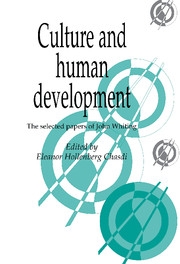Book contents
- Frontmatter
- Contents
- List of figures
- Preface
- Acknowledgments
- Introduction: John Whiting and anthropology
- Fifty years as a behavioral scientist: autobiographical notes
- Part I Theory and methods
- Introduction
- 1 Contributions of anthropology to the methods of studying child rearing
- 2 The cross-cultural method
- 3 A model for psychocultural research
- Part II Environment and history
- Part III Moral development
- Part IV Gender development
- Part V Development of social behavior
- Bibliography
- Complete bibliography of John W. M. Whiting's work
- Index
1 - Contributions of anthropology to the methods of studying child rearing
Published online by Cambridge University Press: 23 December 2009
- Frontmatter
- Contents
- List of figures
- Preface
- Acknowledgments
- Introduction: John Whiting and anthropology
- Fifty years as a behavioral scientist: autobiographical notes
- Part I Theory and methods
- Introduction
- 1 Contributions of anthropology to the methods of studying child rearing
- 2 The cross-cultural method
- 3 A model for psychocultural research
- Part II Environment and history
- Part III Moral development
- Part IV Gender development
- Part V Development of social behavior
- Bibliography
- Complete bibliography of John W. M. Whiting's work
- Index
Summary
The contributions of anthropology to the study of child rearing may be divided into three categories – conceptual, methodological, and substantive. On the conceptual side, the field of anthropology has contributed the concept and analysis of culture. On the methodological side, anthropologists have developed the ethnographic interview, participant observation, and the genealogical methods. On the substantive side, the major contribution of anthropology has been to report a range of variation in many child-rearing practices that goes far beyond any found within Western European society and thus provides a framework for defining cultural variables that are not bound to a single society. It is our purpose to discuss each of these classes of contributions in order.
Concepts
Anthropologists, like other social scientists, have been concerned with human behavior and, like other social scientists, have reported norms and variations in the behavior of people belonging to various societies the world over. They have even at times been concerned with the behavior of individual members of these groups, as evidenced by the numerous biographies and life histories they have produced. Their methods of observing, recording, and assessing human behavior are not strikingly different from those of other behavioral scientists, such as sociologists and social psychologists. In fact, they generally have not been nearly as systematic in sampling and counting or describing the norms and variations of behavior. Where they have, however, made a unique conceptual contribution is in the formulation of the shared symbolic determinants of behavior, which, in our view, is the essential feature of the concept of culture.
- Type
- Chapter
- Information
- Culture and Human DevelopmentThe Selected Papers of John Whiting, pp. 48 - 75Publisher: Cambridge University PressPrint publication year: 1993



